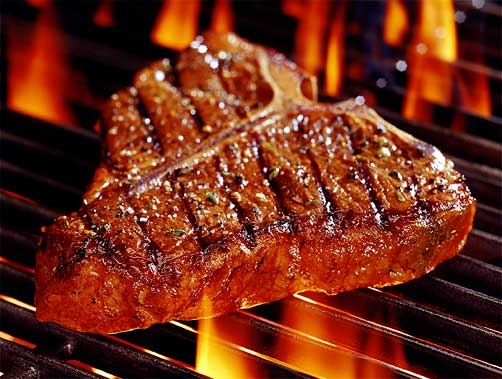
Something Andrew Vachss said in an interview once really stuck with me. For any of you who don't know, Vachss is a man who has dedicated his life to exposing and punishing child molesters, and his authorship is one aspect of his mission. Unlike so many with axes to grind, he's actually damned good.
Asked about this, Vachss made an analogy to a steak: if you take a piece of meat without a bit of fat on it, the thing is going to taste like cardboard. You need a little bit of marbling to give the meat a bit of sizzle, a bit of taste.
This week I've read the first three Travis McGee books and
The Little Country, an older work by another favorite, Charles DeLint. The first thing that struck me is sizzle.
A big chunk of what makes the McGee books so compelling are Travis's riffs on society, culture, our humanity and inhumaity and the strange, sad, savage journey we all make from cradle to grave. John D. MacDonald vents his anger and sorrow and love, his world-destruction fantasies and, ultimately, his pride as our frail and foolish species rages against the dying of the light.
A bunch of years ago, I thought JDM wrote his novels in order to publish his rants. Later, it seemed to me that he put those wonderful, compelling riffs in to flesh out his slightly skeletal stories.
Now, I'm not sure which is the steak and which is the sizzle.

MacDonald's writing is deceptively elegant. Like a well-marbled steak, his work is threaded through with entertainment and flavor. For example, both
The Little Country and
The Deep Blue Good-by follow the time-tested structure of
scene and sequel.
Throughout
The Little Country, the protagonists act, assess, then act again. This structure is unobtrusive, and it keeps us grounded in the believability of the characters' actions. It's well done.
The first chapter
The Deep Blue Good-by, McGee acts: he refuses to help the damsel in distress. Chapter two, McGee goes to a party, drinks a little too much, has sex with a stranger, drinks a little more, riffs a little bit on the emptiness of his life. The whole chapter is all of five or six pages, and it does an amazing amount of work:
1) McGee's dissatisfaction and ennui is plain and convincing. We understand why he's going to take the job.
2) McGee is revealed as a complicated character: his conscious and unconscious desires are wildly at odds. He tells everyone, including himself, that all he wants is laziness and pleasure, and stealing from thieves is a way to afford this life. But faced with just what he professes to want,
we see, even if he doesn't, how much he despises the prospect of endless frivolity. He *needs* to do a good deed in a bad world.
3) We get a peek into a hedonistic lifestyle that for most of us is alien and exotic.
4) We get one of those marvelous mini-essays, dripping with mid-60's angst.
And JDM does this kind of thing throughout the book!

